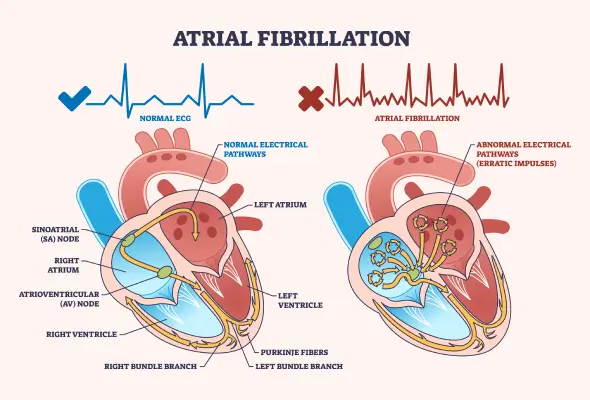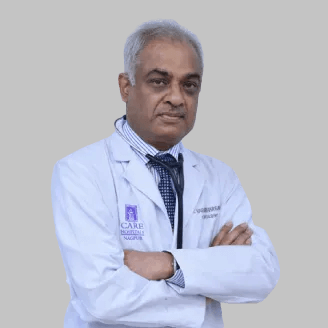-
Doctors
-
Specialities & Treatments
Centre of Excellence
Specialties
Treatments and Procedures
Hospitals & Directions HyderabadCARE Hospitals, Banjara Hills CARE Outpatient Centre, Banjara Hills CARE Hospitals, HITEC City CARE Hospitals, Nampally Gurunanak CARE Hospitals, Musheerabad CARE Hospitals Outpatient Centre, HITEC City CARE Hospitals, Malakpet
HyderabadCARE Hospitals, Banjara Hills CARE Outpatient Centre, Banjara Hills CARE Hospitals, HITEC City CARE Hospitals, Nampally Gurunanak CARE Hospitals, Musheerabad CARE Hospitals Outpatient Centre, HITEC City CARE Hospitals, Malakpet Raipur
Raipur
 Bhubaneswar
Bhubaneswar Visakhapatnam
Visakhapatnam
 Nagpur
Nagpur
 Indore
Indore
 Chh. Sambhajinagar
Chh. SambhajinagarClinics & Medical Centers
Book an AppointmentContact Us
Online Lab Reports
Book an Appointment
Consult Super-Specialist Doctors at CARE Hospitals

Atrial Fibrillation
Symptom, Causes, Diagnosis and Treatment
Atrial Fibrillation
Atrial fibrillation (AF) is a common heart rhythm disease. It can impact a person's quality of life. Atrial fibrillation, often called AFib, occurs when the heart's upper chambers beat irregularly and are out of sync with the lower chambers. This can result in various symptoms and complications, making understanding and managing effectively crucial.

What is Atrial Fibrillation?
Atrial fibrillation, often called AFib or AF, is the most common type of abnormal heart rhythm disease. It happens when the upper chambers of the heart (atria) experience irregular electrical activity, causing them to quiver or "fibrillate". Ideally, they should be contracting normally. This leads to an irregular and often fast heartbeat, which can significantly impact a person's health.
In a healthy heart, the rate is usually between 60 and 100 beats a minute when resting. However, with atrial fibrillation, the heart rate can become highly irregular and sometimes exceed 100 beats per minute. This irregularity means the heart doesn't pump blood as efficaciously as it should, which can lead to various complications.
Types of Atrial Fibrillation (Afib)
Atrial fibrillation (AFib) is classified based on how long it lasts and how it responds to treatment:
- Paroxysmal AFib: It is characterised by episodes that come and go, typically lasting less than a week. These episodes often stop within 48 hours without any treatment. People with paroxysmal AFib may experience brief events that pass without symptoms or feel them strongly.
- Persistent AFib: It lasts for at least seven days in a row and usually requires treatment to restore normal rhythm. This type is progressive, which means it can worsen over time and may eventually become permanent. Persistent AFib often develops in individuals who previously had paroxysmal AFib.
- Long-standing Persistent AFib: In this type, the abnormal heart rhythm lasts more than a year without improving. This type of AFib is more challenging to treat and may require more aggressive interventions.
- Permanent AFib: It is present all the time and does not improve with treatment. In this case, the focus shifts to managing symptoms and preventing complications rather than trying to restore a normal heart rhythm.
Symptoms of Atrial Fibrillation (AFib)
Atrial fibrillation symptoms can vary from individual to individual, and some people may not experience any noticeable signs at all. Common symptoms of atrial fibrillation are:
- Irregular Heartbeat: People often describe feeling a rapid, fluttering, or pounding sensation in their chest.
- Fatigue: Extreme tiredness is a frequent complaint among those with atrial fibrillation.
- Shortness of Breath: This can occur during physical activity or even at rest.
- Dizziness or Lightheadedness: The irregular heart rhythm can cause a dip in blood pressure (hypotension), resulting in these sensations.
- Weakness: Some individuals may feel a general lack of strength or energy.
- Chest Pain or Pressure: This symptom requires immediate medical attention, which could indicate a heart attack.
- Reduced Exercise Capacity: People with atrial fibrillation may have difficulty carrying out physical activities.
- Anxiety: The awareness of an irregular heartbeat can cause feelings of worry or unease.
Causes and Risk Factors of Atrial Fibrillation
Several factors can contribute to the development of atrial fibrillation. They are:
- Heart conditions like hypertension, coronary artery disease, and heart valve disease
- Medical issues, including an overactive thyroid gland, lung diseases (like COPD), and sleep apnoea
- Age plays a crucial role, with the likelihood of developing atrial fibrillation rising as people get older, especially after 65
- Family history and genetics increase susceptibility to this condition
- Lifestyle choices like excessive alcohol consumption, smoking, and the use of illegal drugs
- Obesity & stress can also contribute to the development of atrial fibrillation
Complications of Atrial Fibrillation
Atrial fibrillation can cause serious health complications if left untreated. These include:
- Blood Clots: When the heart's upper chambers quiver instead of contracting normally, blood can pool and form clots. These clots may travel to different body parts, causing severe problems.
- Stroke: People with this condition are five times more likely to have a stroke compared to those without it. A clot that reaches the brain can block blood flow, depriving brain cells of oxygen and causing potentially life-threatening damage.
- Heart Failure: The irregular and rapid heartbeat in Afib can weaken the cardiac muscle over time. This weakening makes it harder for the heart to pump blood effectively, leading to symptoms like weakness, fatigue, and shortness of breath.
- Bleeding in the Organs: Afib may cause bleeding in the GI tract, urinary tract, or brain.
Diagnosis
Diagnosing atrial fibrillation (Afib) involves a combination of medical history, physical examination, and various tests. The investigations may include:
- Electrocardiogram (ECG or EKG): Atrial fibrillation ECG measures the heart's electrical activity, showing the rhythm and how fast the heart is beating.
- Blood Tests: They check for conditions that might affect the heart or cause irregular heartbeats, such as thyroid disease and show how well the liver and kidneys work.
- Echocardiograms: They use sound waves to create images of the beating heart, showing how blood flows through the heart and valves.
Treatment for Atrial Fibrillation
Treating atrial fibrillation involves a combination of approaches to control heart rhythm, prevent blood clots, and manage underlying conditions. These may include:
- Medications: Blood thinners help prevent blood clot formation in the heart. Doctors may prescribe calcium channel blockers or beta-blockers to control heart rate.
- Cardioversion: It is a procedure that uses electric shocks or medication to reset the heart's rhythm.
- Catheter Ablation: Doctors may recommend catheter ablation for those who don't respond well to medication. This procedure involves creating small scars in the heart tissue. These scars disrupt the abnormal electrical signals, causing atrial fibrillation.
- Advanced Atrial Fibrillation Treatments: These include the Maze procedure, which creates a framework of scar tissues in the heart to control irregular rhythms, or the implantation of a pacemaker to regulate heartbeat.
When to See a Doctor
Immediately seek medical guidance if you notice any of the below-mentioned changes:
- If you feel a sudden change in your heart rhythm
- If you're also experiencing dizziness or shortness of breath.
- If you have chest pain that comes & goes, even if it disappears quickly
- If you experience sudden chest tightness or pain that spreads to your shoulder, arms, neck, jaw, or back
Prevention
Preventing atrial fibrillation involves making heart-healthy lifestyle choices. These include:
- Regular Exercise: Dedicate at least half an hour for moderate-intensity physical activity (brisk walking, swimming, or cycling) 5-6 days a week.
- A Heart-healthy Diet: Focus on eating foods low in salt, saturated fats, and cholesterol. Include plenty of organic fruits, vegetables, and whole grains. Consider adopting a Mediterranean-style diet, which has been shown to benefit heart health.
- Managing Underlying Conditions: Keep high blood pressure, high cholesterol, and diabetes under control through medicine and lifestyle changes. If you have sleep apnoea, seek appropriate treatment, as this condition has been linked to an increased risk of atrial fibrillation.
- Healthy Lifestyle: Avoiding excessive alcohol, quitting smoking and limiting caffeine consumption can also help prevent AFib episodes.
- Stress Management: find ways to reduce and manage stress through relaxation techniques, yoga, or meditation.
Conclusion
Living with atrial fibrillation doesn't mean giving up on a full and active life. People can reduce their risk of complications by making heart-healthy choices, such as staying physically active, eating a balanced diet, and managing stress. Regular check-ups and open communication with doctors are key to staying on top of the condition. With the right approach, those affected by atrial fibrillation can lead healthy, fulfilling lives while keeping their hearts in rhythm.
FAQs
1. Is atrial fibrillation life-threatening?
Atrial fibrillation can lead to serious consequences, such as a stroke if left untreated, as AFib can result in blood clots forming in the heart. These clots may travel to the brain, potentially causing a stroke.
Low blood pressure (hypotension) itself doesn't typically cause atrial fibrillation. However, it can be a symptom of underlying conditions that may contribute to AFib. If you experience persistent low BP and irregular heartbeats, consult a doctor for proper evaluation.
To Book an Appointment, call:
Still Have a Question?




